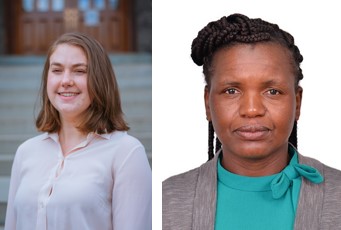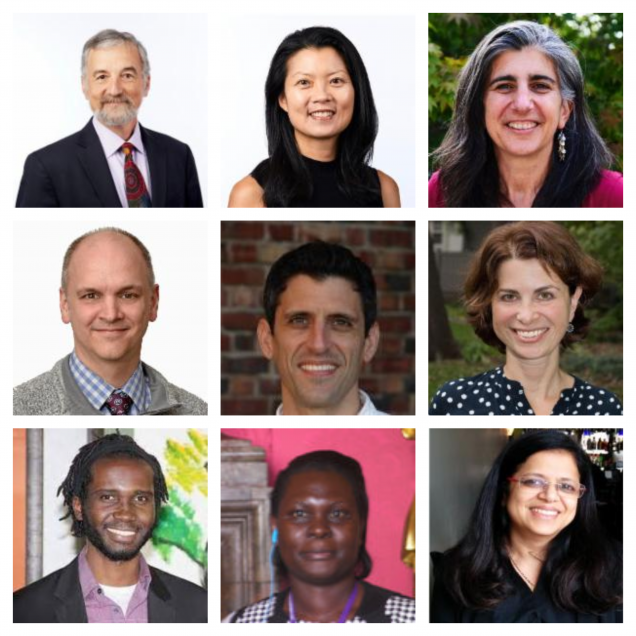The International URBAN ARCH Training & Mentoring Program
The International URBAN ARCH Center Training & Mentoring Program
One of the primary objectives of the International URBAN ARCH Center is to provide ongoing training and mentoring to support early and mid-career investigators as they develop into future leaders in HIV and alcohol research. By leveraging the expertise of senior investigators in the field, the Training & Mentoring Program plans to create and sustain valuable mentoring relationships, while building a network of trainees and early stage investigators. This program aims to facilitate training in research methods and concepts related to HIV, alcohol, and international research; support new grant submissions and analyses, including facilitating access to URBAN ARCH repository data; and connect trainees to each other and to senior International URBAN ARCH Center investigators. The program offers the following:
Drop-in Mentor Office Hours: These one-hour open office hour sessions provide trainees with the opportunity to connect with a senior International URBAN ARCH Center investigator and other early stage investigators to network or receive feedback and guidance on a grant submission, analysis, or career development. Over the past year, 19 office hour sessions were held. One participant commented, “The different sessions I have attended have been very productive. I really appreciate the opportunity to discuss ideas virtually face to face, much better than an e-mail conversation.”

Conversations during these monthly sessions have also led to exciting new connections and career developments. For example, through the training program, Sarah Weber, an undergraduate student at Georgetown University, completed senior thesis work with the URBAN ARCH team during summer 2022. Sarah commented, “Under Dr. Lunze’s mentorship, my senior thesis topic, the intersection of HIV and substance use disorder (SUD) in Russia, coalesced into an investigation into care coordination and co-location in St. Petersburg using the LINC-II dataset. I am excited to put my newfound experience in research methodology, data coding, and literature search to use!”
Additionally, Loice Mbogo, another participant and research study coordinator working at the University of Washington, is currently working towards pursuing her MPH degree at Emory University after seeking advice on applying to programs during various office hour sessions. When asked about the impact the program has had on her career path, Loice commented, “I joined [the program] this year while in Kenya and I have benefited in various areas of research such as analysis and research ideas and approaches. I have been well guided by mentors who I met through this platform, such as Dr. Kaku [So-Armah], in my career path decisions, research ideas, and how to access important resources. URBAN ARCH is a great platform to learn and stay connected.”

Workshops: The program also hosts interactive workshops for trainees and early-stage investigators. Dr. Judy Hahn led the first workshop in January 2022, focused on current problems and innovations in measuring alcohol use through self-report, alcohol biomarkers, alcohol biosensors, and social desirability scale in both observational and intervention studies among people with HIV. One participant commented that they “learned a lot about common [alcohol] biomarkers… This was really interesting to put everything into perspective and understand where these tests fit in.” A recording of this workshop is available here. Dr. Kaku So-Armah hosted a hackathon-style workshop centered on finding solutions to complex questions in international HIV, TB, and alcohol research. Participants were invited to break out into small groups to discuss a real-life study challenge, and one participant noted that it was “interesting to hear different ideas and aspects from different people.” Dr. Sowmya Rao hosted the program’s third workshop, which was focused on understanding the research process from a statistical point of view. Participants commented that the workshop was “very useful” with “great tips and tricks for data analysis/presentation.”
Dr. Karsten Lunze will host a workshop on Tuesday, October 11th, from 11m-12pm ET / 8am-9am PT to discuss opportunities for HIV and substance use research using data from the recently completed Linking Infectious and Narcology Care – Part II (LINC-II) study, a randomized controlled trial among 225 people with HIV who inject drugs, evaluating a multifaceted intervention (i.e., rapid access to ART, naltrexone for the treatment of opioid use disorder, strengths-based case management) compared to standard of care. Those who are interested in attending this upcoming workshop should register here.
Visiting Scholar Webinars: The team coordinates quarterly visiting scholar research-in-progress webinars. So far, the webinars have focused on highlighting the work of other NIAAA-funded P01 HIV/alcohol centers, which has allowed attendees to learn about ongoing research in this field as well as potential opportunities for collaboration. The first webinar in March 2022 was hosted by Dr. Karen Cropsey, principal investigator of the Zambia Alabama HIV Alcohol Comorbidity Program (ZAMBAMA). A recording of this webinar is available here. In June 2022, Drs. Sylvie Naar and Karen MacDonell discussed the SHARE Program (Self-Management of HIV and Alcohol Reaching Emerging Adults). A recording of this webinar is available here. The next webinar is scheduled for Thursday, September 29th, from 3pm-4pm ET / 12pm-1pm PT where Dr. Geetanjali Chander will present on the Alcohol Research Consortium in HIV (ARCH). Those interested in attending this webinar should register here.
In addition to these activities, the International URBAN ARCH Center recently issued a call for proposals inviting trainees and early-stage investigators to submit ideas for analyses using URBAN ARCH repository data. Accepted proposals will receive statistical guidance from the Biostatistics and Data Management Core, analytic support from the Boston University Biostatistics and Epidemiology Data Analytics Center (BEDAC), support from investigators and project administrators to prepare manuscripts and submit results to conferences, as well as financial support to present findings at the 2023 International URBAN ARCH Center Annual Meeting in Boston, MA. Proposals are due by September 30th and can be submitted here.
We are also excited to partner with a number of other HIV/alcohol centers and CFARs to expand training and mentoring opportunities for our trainees. One opportunity to note is the Inter-CFAR Substance Use Research Community (I-SURC). The I-SURC connects researchers from the fields of substance use and HIV across the CFARs to create research synergies, innovations and new capacities. Membership is available to all investigators at CFAR institutions, and members can participate in symposia, access collaborators and cohorts within the network, participate in external reviews for developmental proposals, and pursue collaborative initiatives with other members. More information is available here.
Are you an early stage investigator or trainee who would like to benefit from the resources and offerings of the International URBAN ARCH Center Training & Mentoring Program? The best way to get involved is to fill out this form in order to join the program and stay up to date on upcoming events and trainee opportunities. Trainees are not required to commit to a certain level of participation and are encouraged to utilize the components of the program most appropriate given their career trajectory and time commitments. Senior investigators and mentors are encouraged to share this information with anyone that they feel may benefit from this program. We hope to see many new faces at future events!